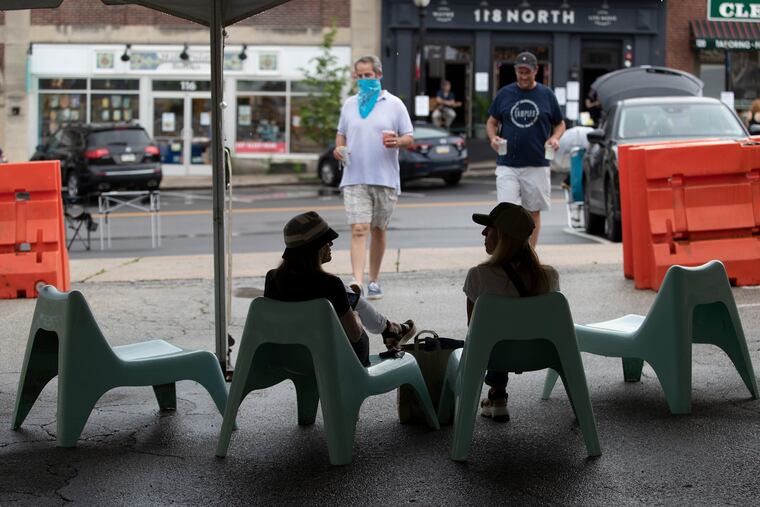Anxious about reopening? Here’s what you can do, according to experts.
“Everyone wants to go back to normal. But it’s possible that situations like walking with a group of people will make people irritable, upset or nauseous.”

As Philadelphia adjusts to its first week in the yellow phase of reopening, meaning that businesses can reopen and gatherings of fewer than 25 people are allowed (although discouraged), many people might feel excited about the prospect of socializing or shopping again. But there may also be some anxiety about staying healthy as we reenter society.
These feelings of anxiety are perfectly normal, according to therapists, especially in a time of heightened stress — recent Census Bureau data found that 30% of Americans now show symptoms of generalized anxiety disorder.
“Coronavirus has been unprecedented in our lifetimes,” said Gerald T. O’Brien, associate director at the Anxiety and Agoraphobia Treatment Center in Bala Cynwyd. “One of the things I say a lot to my clients is, ‘If you’re not worried or anxious to some extent, you’re not paying attention because so many changes have taken place.’"
Over the last few months, O’Brien has worked with people who have been too anxious to even go to the grocery store. Although that’s understandable, given the circumstances, he said that it’s important to not fight feelings of worry.
“Emotions are normal parts of being alive, so anxiety can be a signal to our bodies, telling us to pay attention to potential risk and danger,” O’Brien said. “It certainly applies to our current time.”
Alissa Silverman, a psychologist at Silver Linings Psych in Center City, said that some of her clients weren’t sure how they were going to feel until the reopening actually happened, because it had been pushed back so many times since the beginning of the shutdown.
“For a lot of people, we’re still on a day-to-day basis,” Silverman said. “There’s an element of, ‘Is this really happening?’ We’re moving into the next wave of uncertainty.”
» READ MORE: What our social lives will look like in the yellow phase
Plan ahead
If you must go back to work, Silverman recommends thinking through situations beforehand that might cause you anxiety, such as taking the subway, and brainstorming ways that may make you feel more comfortable in those situations. That might mean coming up with an alternative mode of transportation such as walking or biking to work.
“Everyone wants to go back to normal, so we’re all focused on that. But it’s possible that situations like walking with a group of people will make people irritable, upset or nauseous," Silverman said.
To avoid such intrusive thoughts as “Please stop talking, please don’t touch me” when around other people, Silverman recommended preparing responses that can help alleviate anxiety, such as saying no to a group of friends who want to eat lunch together.
“People should prepare themselves and write down what they’re going to do in different situations, so they don’t have to make decisions that they’re uncomfortable with when put on the spot,” she said. “It can be helpful to ask yourself questions like, ‘What is my day going to look like? What am I going to do if everyone around me isn’t wearing a mask? What am I going to do when I feel anxious?’”
» READ MORE: Health-care workers feel more stress and anxiety than ever as coronavirus restrictions lift
Stick to your plan
O’Brien said that you need to decide for yourself what you’re comfortable with, so you can’t be bullied into participating in things that make you feel unsafe.
And that doesn’t mean you can’t participate in activities until there’s a vaccine. He pointed out that over the course of the pandemic, people have come up with creative ways to continue such traditions as graduations and birthdays while staying socially distanced, a practice that he thinks will continue for some time.
Focus on what you can control
O’Brien encouraged people to focus on the factors that they can control as they begin to navigate the yellow reopening phase.
For example, if you’re going back to work, remember that many employers have made major changes in how they operate their businesses to make employees feel as safe as possible.
“There are so many things about coronavirus that are outside our control,” O’Brien said. “So we should focus on following appropriate guidelines, wearing face coverings, washing our hands and using hand sanitizer. It’s not realistic to be completely calm, since no one really knows what the new normal is.”
He also encouraged proper self-care, such as exercising and going outside.
“There are so many unknowns, but we can find balance between appropriate precautions and overreactions," he said.